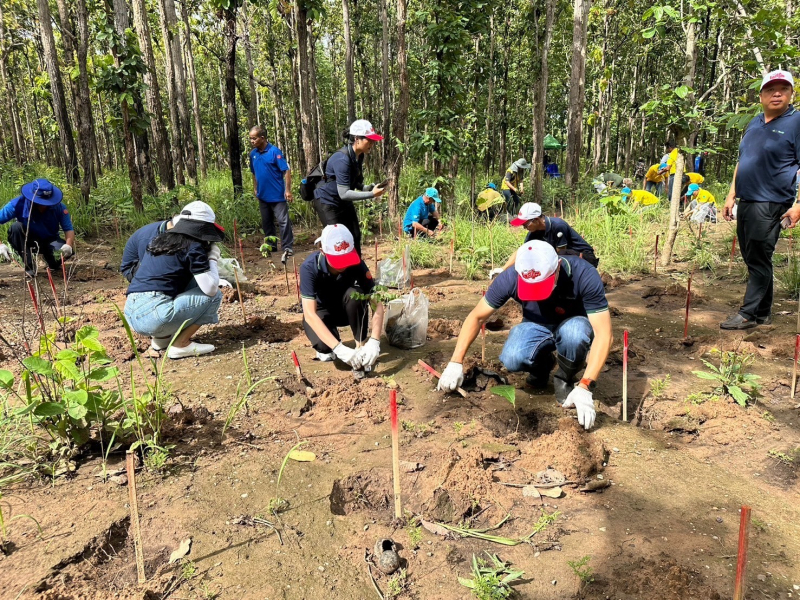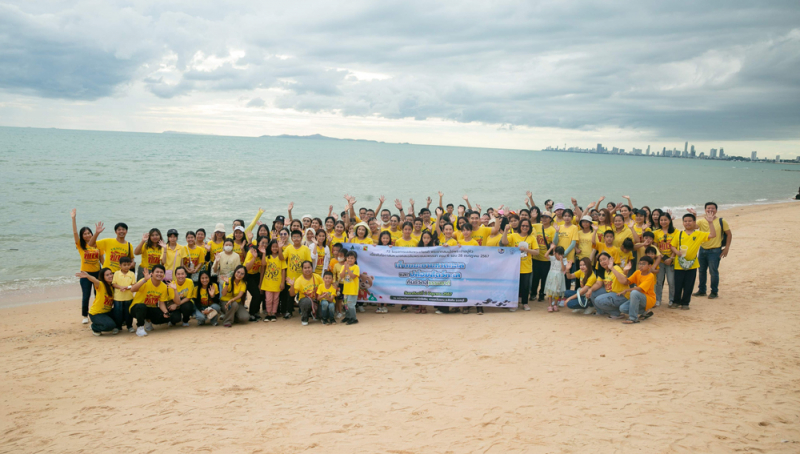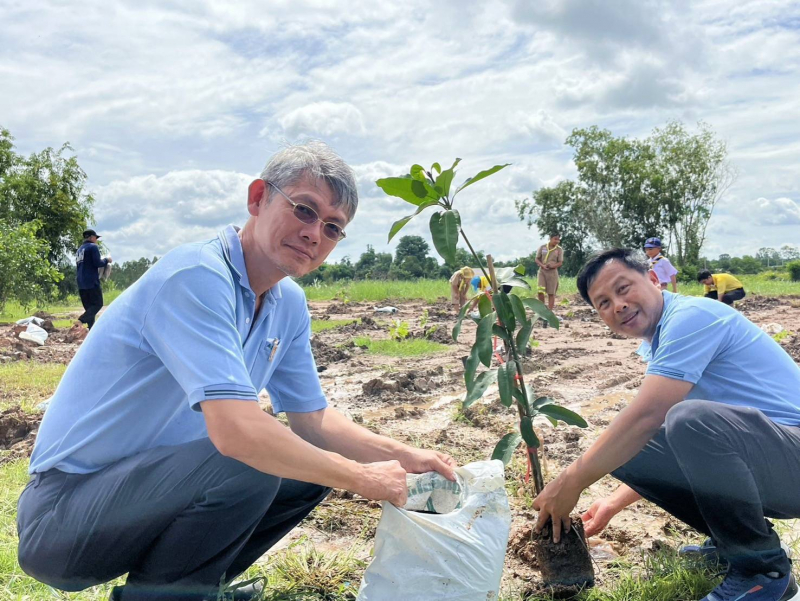
test

2 End hunger, achieve food security and improved nutrition and promote sustainable agriculture

goal 3

goal 4

goal 5

goal 6

goal 7

goal 8

goal 9

goal 10

goal 11

goal 12

goal 13

goal 14

goal 15

Goal 16
16.3: Promote the rules of law and the national and international levels and ensure equal access to justice for all.
16.5: Substantially reduce corruption and bribery in all their forms
16.7 Ensure responsive, inclusive, participatory and representative decision-making at all levels
16.b: Promote and enforce non-discriminatory laws and policies for sustainable development

Goal 17
Biodiversity
BJC Group acknowledges the influence and connection between climate change and the environment, especially biodiversity, which represents the global system, that supports all life, including all fauna and flora, and its significance to rehabilitate, restore and protect the global ecosystem, which is critical to the wellbeing and survival of both society and the environment, enabling corporations to continue the activities of farming, harvesting and sourcing of critical raw materials, used in the production of goods and services, fostering business growth, while protecting society against the human rights violations of a clean, healthy and sustainable environment, which may arise from chronic and acute climate-related risks.
To foster the 1 + 5 Strategy, BJC group utilized the established BJC Biodiversity Road Map, which provides an underlying guideline of how BJC group will manage and interact with biodiversity across the value chain to foster a balance between business activities and environmental wellbeing, ensuring that BJC group strives to minimize negative biodiversity impacts. This is achieved through strict compliance to the corporatewide BJC Biodiversity and Deforestation Policy, which is further enforced through the BJC’s Standards Operating Procedure of Biodiversity Management, enforcing all business to take early steps to secure biodiversity, and benefit from the opportunities available, which empowers BJC group to remain competitive and create a net positive impact on biodiversity, through the implementation of diverse and targeted initiatives which aim to minimize negative consequences on biodiversity throughout the value chain.
The BJC Biodiversity and Deforestation Policy is governed by the Sustainable Development Committee (SDC), and is regularly reviewed and updated to fit with the continuously evolving environmental needs. The policy clearly commits BJC Group to integrate the following biodiversity related considerations into all operations and decision-making.
The scope of BJC's Environmental Policy also extends to include biodivrsity protection, through a recognition that biodiversity is the core component to the rehabilitation, restoration and protection of the global ecosystem, a critical component to the wellbeing and survival of both the environment and society, from which companies’ source raw materials to drive business operations. A lack of functioning biodiversity will result in a chain of direct and indirect consequences to the ecosystem, which in turns effects business operations, from a lack of ability to source quality and reliable raw materials for the production of products and services, chronic and acute climate-related risks, and volatile operational expenses from a lack of resources available.
BJC has longed recognized the important role of biodiversity to the overall health and wellbeing of the ecosystem and has developed the BJC Biodiversity Roadmap as an overarching guideline to create a balance between business activities and the environment, to minimize negative implications and foster long-term sustainability for both, in addition to the BJC’s Standard Operating Procedure of Biodiversity Management, as a guideline for all business units to take early steps to secure biodiversity, and seize opportunities that enable BJC to remain competitive and to create net positive impact on biodiversity, implemented through diverse initiatives to minimize negative operational impacts on biodiversity throughout the value chain.

Biodiversity, Deforestation Targets and Progress
In 2024, BJC reviewed and updated its biodiversity commitment to better align with the company’s operational context and sustainability strategy.In 2025, the Management Board approved revisions to key biodiversity‑related targets, accelerating the No Net Loss target from 2032 to 2030, and the Net Positive Impact and No Gross Deforestation goals from 2050 to 2030. Following the prioritization of Biodiversity, BJC has established a long-term targets and commitment for biodiversity and deforestation as follows;
|
|
|
| Biodiversity | No Deforestation |
| Long-term Goal | Long-term Goal |
| Biodiversity assessment 100% by 2025 | |
|
No net loss of biodiversity by 2030 and determined to prevent and minimize the impact of our activities |
No Gross Deforestation by 2030 |
|
Net Positive Impact (NPI) by 2030 |
Note: 2030 for Own Operation & Supply Chain
Year 2020 was the first year in which BJC took proactive actions in order to achieve the long-term targets in 2030, through the conduct of risk and environmental impact assessment of business units and operational sites, which accounts for 10% of all operations. (Revised in 2025)
Biodiversity Commitment required of Value Chain
| 1 | 2 | 3 |
|
Own operations and supply chain
|
Apply mitigation hierarchy |
Work with external partners |
Biodiversity Exposure and Assessment
BJC does not conduct operations that directly impact biodiversity. For the retail industry, the company procures from suppliers who follow sustainable and ethical practices to ensure that products come from areas without deforestation, and that marine products are sourced from sustainable fisheries. the company also carries out projects that support biodiversity, as per the information below.
In 2024, BJC reevaluates the Biodiversity Exposure and Assessment of business units and their respective critical suppliers with manufacturing operations, such as production, extraction, and plantation. These include Berli Jucker Foods Co., Ltd. (BJF), Berli Jucker Cellox Co., Ltd. (CPC), Rubia Industries Co., Ltd. (RIL), Thai Beverage Can Co., Ltd. (TBC), Thai Glass Industries Co., Ltd. (TGI), Thai Malaya Glass Co., Ltd. (TMG), and Thai-Scandic Steel Co., Ltd. (TSS). The majority of which are located in industrial estates, which have been approved by an Environmental Impact Assessment (EIA) prior to construction. Under the agreement with the respective industrial estates, all operations strictly comply with relevant environmental laws, regulations, and standards, ensuring minimal environmental impacts to surrounding communities and biodiversity. The business units and their suppliers involved in the Biodiversity Exposure and Assessment are shown in the table below;
|
Business Units |
Number of Sites |
Area (Hectares) |
Location |
|
BJF |
2 |
3.48 |
Samut Prakan, Ayutthaya |
|
CPC |
2 |
22.08 |
Prachinburi, Samut Prakan |
|
RIL
|
1
|
2.89
|
Samutprakarn
|
|
TBC |
2 |
17.60 |
Saraburi |
|
TGI |
1 |
11.52 |
Samutprakarn |
|
TMG |
2 |
24.03 |
Saraburi |
|
TSS
|
1
|
4.38
|
Rayong
|
|
Total |
11 | 85.98 |
According to the 2024 Biodiversity Assessment conducted by BJC, the sites studied were found to have no biodiversity-related risks and therefore do not require a biodiversity management plan.
(I) Assess and Interpret & Prioritize
BJC identifies the most material impacts on natural resources by referring to Corporate Environmental Policy which mentioned about protected areas, including the World Heritage areas in accordance with the criteria of UNESCO, and protected areas according to The International Union for Conservation of Nature (IUCN) category 1-4. BJC Group use these areas as the target protected areas for business units to verify if BJC’s and critical suppliers’ operational activities are close by.
BJC also uses Aqueduct™ tools to identify and evaluate current water risks in all Thailand’s provinces (baseline water stress level). The tools belong to World Resources Institute (WRI), which can map water risks such as floods, droughts, and stress, using open-source, peer reviewed data.
(II) Measure & Set
As a result, from conducting the biodiversity exposure and assessment in 2024 across BJC’s business units and their critical suppliers, no biodiversity-related risks were identified. This outcome demonstrates the effectiveness of BJC’s proactive assessment framework and reinforces the company’s commitment to ensuring that its operations and supply chain do not adversely affect biodiversity.
(III) Mitigation Plan
Since there is no operational activity nearby or located in the protected areas and no operational activity creates negative impact to biodiversity, the mitigation plan includes surveillance and rehabilitation plans.
- Surveillance Plan : All business units and their critical suppliers monitor and ensure that their current operational activities remain efficient and effective regarding the impact created to biodiversity. Moreover, they have to keep updated with the current issues regarding biodiversity nationwide and worldwide, and be ready to adjust their business operations accordingly.
- Rehabilitation Plan : Not only to avoid creating negative impact to biodiversity, BJC encourages all business units and their critical suppliers to conserve and strengthen biodiverstiy in their areas as well. The plan is normally executed through various of activities throughout each year.
- This rehabilitation plan also extends to all subsidiaries under BJC. e.g.
Example of biodiversity mitigating acting as follow:
|
Transform |
Transform operations to help reduce negative impacts |
|
In 2024, BJC continues to utilize Electric Vehicle (EV) Trucks for transporting goods from distribution centers to BigC branches. This initiative reflects BJC’s ongoing effort to reduce greenhouse gas emissions from logistics operations while promoting low-carbon transportation solutions across its retail network. |
|
|
Restore |
Restore biodiversity restoration |
|
In 2024, Berli Jucker Cellox Ltd. (CPC) continued its project to release aquatic native species into the Prachin Buri River, promoting the idea of “Living Sustainably in Harmony with Nature.” The initiative involved the release of 150,000 fish and other aquatic species to help restore local biodiversity in the river ecosystem. |
|
|
Regenerate |
Regenerate the creation of natural diversity |
|
|
In collaboration with the Chiang Mai Potato Growers Cooperative and Mae Faek Mai Subdistrict Municipality, Berli Jucker Foods (BJF) conducted a reforestation project, planting 2,000 trees across 20 rai of land in Chiang Mai. |
|
Reduce |
Reduce the negative impact on biodiversity |
|
|
Big C prioritizes the responsible sourcing of paper packaging, procuring from suppliers certified by accredited bodies such as the Forest Stewardship Council™ (FSC™) Chain of Custody (CoC), to minimize environmental and social impacts.. |
|
Avoid |
Avoid not establishing operational areas important for biodiversity |
|
|
In 2024, BJF verified 8,654 rai of land across Chiang Rai, Phayao, Lamphun, and Tak provinces to ensure that potato farming operations avoid deforestation, aligning with the company’s No Gross Deforestation commitment. |

(IV) Act
Business unit that operates or whose critical supplier operates close by the protected areas, apply and execute mitigation hierarchy, which is an approach to protect and enhance biodiversity: avoid, minimize, restore and offset. The approach includes preventive action and remedial action.
(V) Track
All business units and their critical suppliers monitor and validate their mitigation plans and actions annually, with a disclosure through BJC Annual Sustainability Report or the company website. The mitigation plans and actions are reviewed for their accuracy, efficiency and effectiveness, as well as for the next year planning. For the operational sites located in the industrial estates, the industrial estates also have their biodiversity and water risks mitigation plans reviewed and updated regularly. This is to maintain their quality of utilities service excellence for all sites operating in their areas.
Throughout 2024, BJC continued to actively monitors potential biodiversity impacts from operations on all manufacturing oriented operations to minimize biodiversity impacts to surrounding ecosystems.
Engagement with Stakeholders on biodiversity
|
BJC Big C Group Volunteers Unite for Beach Cleanup and Marine Wildlife Restoration
The BJC Big C Group organized a meaningful environmental initiative focused on beach cleanup and the release of marine animals back to their natural habitat. The event took place at the Sea Turtle Conservation Center of the Royal Thai Navy in Sattahip District, Chonburi Province. A total of 134 volunteers, including employees and their families, participated in releasing sea turtles and attended an educational session on the lives and conservation of sea turtles and other marine species. The team also collected 17 kilograms of waste from Tawanron Beach, contributing to the preservation of this scenic coastal area.
|
|
||
|
Berli Jucker Foods Continues Reforest Initiative for Watershed Reforestation
Berli Jucker Foods collaborated with the Chiang Mai Potato Farmer Cooperative Limited and the Village Headmen and Community Leaders of San Sai District, Chiang Mai, to organize a nature and environmental conservation activity. This project is dedicated to revitalizing degraded forest areas, increasing watershed forest coverage to benefit local communities and ensuring a reliable water source for agriculture. As part of this effort, over 2,000 trees were planted, comprising 13 species, including Siamese Rosewood, Indian Gooseberry, Burma Padauk, Large-Leaf Mahogany, Agarwood, Red Sanders, Bamboo (Phai Sang Nuan), White Cheesewood, Rosewood, Cassia, Burmese Blackwood, Teak and Tamarind. The restored forest will directly support approximately 1,500 rai of farmland cultivated by potato farmers under the company’s contract farming program, fostering both environmental and agricultural sustainability. |
 |
||
|
Planting Big Trees for Our House
Berli Jucker Cellox Co., Ltd., Prachinburi Plant organized a volunteer activity with Tha Toom Subdistrict Administrative Organization at Nong Krachap, Prachinburi. |
|
||
|
|
|
||



